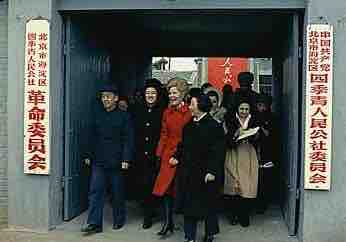Nixon's Visit to China
Richard Nixon's 1972 visit to the People's Republic of China (PRC) was an important step in easing relations between the two countries. The visit marked the first time a U.S. president had entered the PRC, which at that time considered the U.S. one of its staunchest enemies. Since the Chinese Civil War, the U.S. had not had diplomatic relations with the Beijing government, instead recognizing the Republic of China in Taiwan as the legitimate Chinese government.
Nixon's policy on China was greatly influenced by Henry Kissinger, the National Security Advisor and future Secretary of State with whom the President worked closely (often bypassing Cabinet officials). Early in his first term, Nixon and Kissinger began sending subtle overtures to the PRC government. With relations between the Soviet Union and China at a low point—border clashes between the two took place during Nixon's first year in office—Nixon sent private word to the Chinese that he desired closer relations. A breakthrough came in early 1971, when Chairman Mao invited a team of American table tennis players to visit China and play against top Chinese players. Nixon followed up by sending Kissinger to China for clandestine meetings with Chinese officials. On July 15, 1971, it was simultaneously announced by Beijing and by Nixon that the President would visit China the following February. The announcements astounded the world. The secrecy allowed both sets of leaders time to prepare the political climate in their countries for the contact.
In February of 1972, Nixon and his wife traveled to China, accompanied by over 100 television journalists. On Nixon's orders, television was strongly favored over printed publications, as Nixon felt that the medium would capture the visit much better than print. Nixon and Kissinger met for an hour with Mao and Zhou at Mao's official private residence, where they discussed a range of issues. Nixon and Zhou agreed to a joint communique addressing the nations' shared interests and common positions on geopolitical questions. Controversially, the communique recognized Taiwan as a part of China and looked forward to a peaceful solution to the problem of reunification. The statement enabled the U.S. and PRC to temporarily set aside the "crucial question obstructing the normalization of relations" concerning the political status of Taiwan and to open trade and other contacts. However, the United States continued to maintain official relations with the government of the Republic of China in Taiwan until 1979, when the U.S. broke off formal diplomatic relations with the Republic of China and established full diplomatic relations with the PRC.
Effects
The repercussions of Nixon's visit to China were vast. The improved relations between the U.S. and PRC entailed a significant shift in the Cold War balance of power, pitting China with the U.S. against the Soviet Union. Specifically, Nixon used the improving international environment to address the topic of nuclear arms.
Following the announcement of his visit to China, Nixon made a visit to Moscow, arriving on May 22, 1972. Nixon met and engaged in intense negotiations with Leonid Brezhnev, the General Secretary of the Communist Party. Out of the summit came agreements for increased trade and two landmark arms control treaties: SALT I, the first comprehensive limitation pact signed by the two superpowers, and the Anti-Ballistic Missile Treaty, which banned the development of systems designed to intercept incoming missiles. Nixon and Brezhnev proclaimed a new era of "peaceful coexistence".
A result of United States improved relations with both China and the Soviet Union was a change in America's situation in Vietnam. Both China and the Soviet Union—North Vietnam's two allies and sponsors—cut back on their diplomatic support for North Vietnam, and as a result, the United States began working to withdraw its troops from the region.

First Lady Pat Nixon Tours Begjing during the Presidential Visit to China.
Cameras followed First Lady Nixon's tour of Beijing, allowing Americans their first glimpse of Chinese society (albeit one scripted by the Chinese authorities)